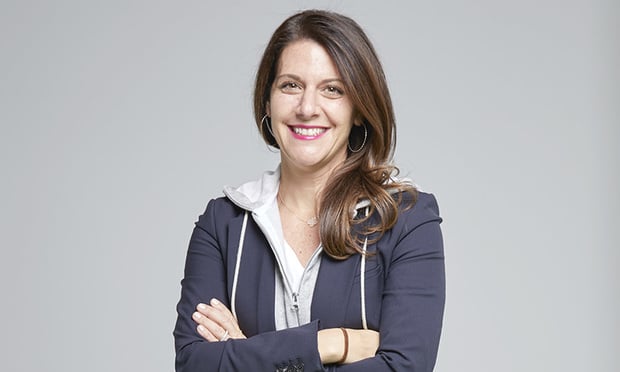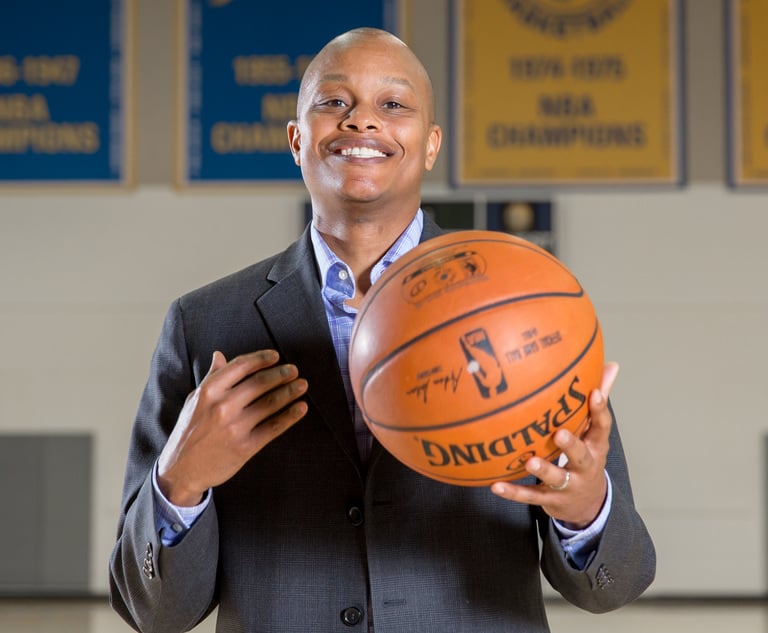Ex-Groupon Lawyer Discusses Decision to Join Cannabis Company
Alissa "Ali" Jubelirer, general counsel of Revolution Enterprises, describes her new position as a "big undertaking. For me, I'll have to get up to speed very quickly on the regulatory framework for each state and make sure that we have processes and policies in place so that we're complying."
June 12, 2019 at 03:17 PM
6 minute read
 Alissa "Alie" Jubelirer, general counsel of cannabis firm Revolution Enterprises.
Alissa "Alie" Jubelirer, general counsel of cannabis firm Revolution Enterprises.
Alissa "Ali" Jubelirer, a former in-house leader and executive for Groupon and Tribune Co., now Tribune Media, has joined a growing number of corporate counsel who have made a leap into the burgeoning cannabis industry.
As the new general counsel of Revolution Enterprises, Jubelirer will manage corporate and compliance matters for the Illinois-based company, which was founded in 2014 and grows, processes and dispenses cannabinoid products for people and pets.
Revolution now has more than 150,000 square feet of marijuana production space, including a main cultivation center in a remote location outside Chicago that has been described as the "Area 51 of pot" due to its high security and secrecy. The company is setting up operations in Florida and plans to expand to other states.
Jubelirer spoke with Corporate Counsel on Tuesday—her second day on the job—about why she went to work for a cannabis company and the regulatory and compliance challenges that lie ahead. The conversation has been edited for clarity and length.
Corporate Counsel: Let's talk about your decision to leave Groupon. What were some of the factors you considered when you decided to make this transition?
Ali Jubelirer: I loved Groupon. I had an awesome run there and this was really not about leaving Groupon so much as jumping into what I considered to be an amazing opportunity to get in at the ground floor of a newish industry and really help build or enhance what Revolution has already accomplished in the few years that they've existed. When I started at Groupon it was 2011 and there were some similarities in terms of my excitement about getting in there and building. I'm ready to do it again.
CC: What was it that attracted you to the cannabis industry?
AJ: I think that the health and wellness aspect of it is really amazing, and there's still so much that we don't know in that respect. Because it's [marijuana] illegal under federal law, the research that's been done is in its infancy and I don't think we even yet understand all the health and wellness benefits. But I have personal experience with friends who have suffered from cancer and have found relief from using cannabis products. I've heard anecdotally from other friends about their experience with CBD about how it helps them sleep and reduces anxiety.
CC: It sounds like you enjoy working for startups.
AJ: I really do love the startup atmosphere. There's a lot of creativity around being able to come in and work with a little bit of an open space and really make your mark. I like the chaos of it and the nonstop nature of startups. I also like that you get to move in and out of your lane a little bit more than in a really big bureaucratic organization.
CC: As Rev expands nationally, you're going to have to deal with different state laws and gray areas. That lack of uniformity seems daunting.
AJ: It is a really big challenge. The regulatory framework in every state is different. With my background in global compliance, I've had the experience of having to work with patchworks of different laws in different countries. Even in the United States, with employment laws, for example, every state has different employment laws that you're going to have to comply with. I have experience managing that. But it is a big undertaking. For me, I'll have to get up to speed very quickly on the regulatory framework for each state and make sure that we have processes and policies in place so that we're complying. And then, of course, it will be training employees so that they also understand what's expected of them. And monitoring and enforcement of the regulatory framework—we take that very seriously because we want to make sure that we're doing things by the book and putting out exceptional products within that framework.
CC: Can you get more specific about the main compliance and regulatory challenges that in-house lawyers in the cannabis industry are facing?
AJ: By way of example, each application process for licensing in each state is different, everything from what they want to hear from you about your plans for how you would roll out cultivation processing and dispensing in the state to details about your background in finances to your hiring, how you plan to staff. Every state has different requirements and there's sort of a point structure to that in terms of winning the license. The application process is the starting point for the many differences. Then if you win a license you need to comply with not only the state regulations but what you've told the state that you intend to do.
CC: Are you the only member of Rev's legal department at this point and will you be building the department?
AJ: There's another attorney here, Abdul Mohamed, and he's great. He's going to be reporting to me. I plan to build the legal department as we grow. We'll need to staff as many people as are required to make sure that we're complying with all these regulatory requirements as well as everything else that comes along, from employment to [intellectual property] needs to litigation. So we'll see.
Read More:
Former Groupon Lawyer Joins Cannabis Company Revolution Enterprises as General Counsel
General Counsel, Stakeholders Still Await FDA Guidance for CBD
1 Year As a Cannabis General Counsel: A Q&A With Jennifer Clifton of Orchid Ventures
This content has been archived. It is available through our partners, LexisNexis® and Bloomberg Law.
To view this content, please continue to their sites.
Not a Lexis Subscriber?
Subscribe Now
Not a Bloomberg Law Subscriber?
Subscribe Now
NOT FOR REPRINT
© 2025 ALM Global, LLC, All Rights Reserved. Request academic re-use from www.copyright.com. All other uses, submit a request to [email protected]. For more information visit Asset & Logo Licensing.
You Might Like
View All
Advance Auto Parts Hires GC Who Climbed From Bottom to Top of Lowe's Legal Department
2 minute read
Compliance With EU AI Act Lags Behind as First Provisions Take Effect

State AG Hammers Homebuilder That Put $2,000-Per-Day Non-Disparagement Penalty in Buyer Contracts
3 minute read
NBA Players Association Finds Its New GC in Warriors Front Office
Trending Stories
- 1'Translate Across Disciplines': Paul Hastings’ New Tech Transactions Leader
- 2Milbank’s Revenue and Profits Surge Following Demand Increases Across the Board
- 3Fourth Quarter Growth in Demand and Worked Rates Coincided with Countercyclical Dip, New Report Indicates
- 4Public Notices/Calendars
- 5Monday Newspaper
Who Got The Work
J. Brugh Lower of Gibbons has entered an appearance for industrial equipment supplier Devco Corporation in a pending trademark infringement lawsuit. The suit, accusing the defendant of selling knock-off Graco products, was filed Dec. 18 in New Jersey District Court by Rivkin Radler on behalf of Graco Inc. and Graco Minnesota. The case, assigned to U.S. District Judge Zahid N. Quraishi, is 3:24-cv-11294, Graco Inc. et al v. Devco Corporation.
Who Got The Work
Rebecca Maller-Stein and Kent A. Yalowitz of Arnold & Porter Kaye Scholer have entered their appearances for Hanaco Venture Capital and its executives, Lior Prosor and David Frankel, in a pending securities lawsuit. The action, filed on Dec. 24 in New York Southern District Court by Zell, Aron & Co. on behalf of Goldeneye Advisors, accuses the defendants of negligently and fraudulently managing the plaintiff's $1 million investment. The case, assigned to U.S. District Judge Vernon S. Broderick, is 1:24-cv-09918, Goldeneye Advisors, LLC v. Hanaco Venture Capital, Ltd. et al.
Who Got The Work
Attorneys from A&O Shearman has stepped in as defense counsel for Toronto-Dominion Bank and other defendants in a pending securities class action. The suit, filed Dec. 11 in New York Southern District Court by Bleichmar Fonti & Auld, accuses the defendants of concealing the bank's 'pervasive' deficiencies in regards to its compliance with the Bank Secrecy Act and the quality of its anti-money laundering controls. The case, assigned to U.S. District Judge Arun Subramanian, is 1:24-cv-09445, Gonzalez v. The Toronto-Dominion Bank et al.
Who Got The Work
Crown Castle International, a Pennsylvania company providing shared communications infrastructure, has turned to Luke D. Wolf of Gordon Rees Scully Mansukhani to fend off a pending breach-of-contract lawsuit. The court action, filed Nov. 25 in Michigan Eastern District Court by Hooper Hathaway PC on behalf of The Town Residences LLC, accuses Crown Castle of failing to transfer approximately $30,000 in utility payments from T-Mobile in breach of a roof-top lease and assignment agreement. The case, assigned to U.S. District Judge Susan K. Declercq, is 2:24-cv-13131, The Town Residences LLC v. T-Mobile US, Inc. et al.
Who Got The Work
Wilfred P. Coronato and Daniel M. Schwartz of McCarter & English have stepped in as defense counsel to Electrolux Home Products Inc. in a pending product liability lawsuit. The court action, filed Nov. 26 in New York Eastern District Court by Poulos Lopiccolo PC and Nagel Rice LLP on behalf of David Stern, alleges that the defendant's refrigerators’ drawers and shelving repeatedly break and fall apart within months after purchase. The case, assigned to U.S. District Judge Joan M. Azrack, is 2:24-cv-08204, Stern v. Electrolux Home Products, Inc.
Featured Firms
Law Offices of Gary Martin Hays & Associates, P.C.
(470) 294-1674
Law Offices of Mark E. Salomone
(857) 444-6468
Smith & Hassler
(713) 739-1250






